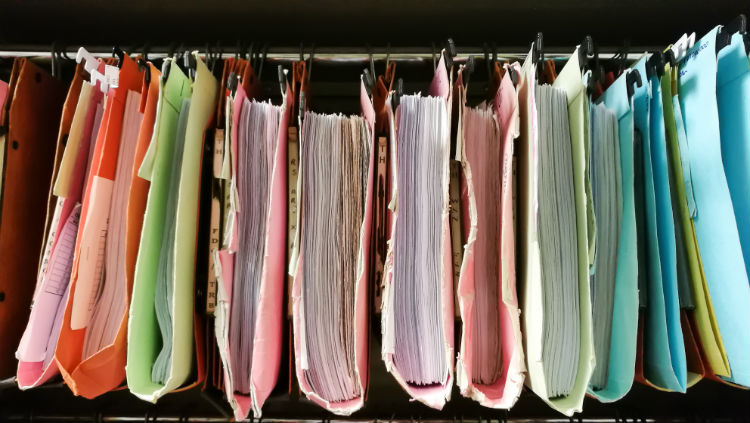If you’re like most people, you probably have a box or two of old files cluttering your closet or a desk drawer that is stuffed to the brim with papers. It’d be nice to sort through all these documents and purge what you don’t need anymore, but knowing what to keep and for how long can be difficult. As a certified professional daily money manager, a national certified guardian and a California licensed professional fiduciary, I often get questions from clients about how to be more organized without making costly mistakes.
Managing all the important paperwork for one household is confusing enough, but things can become even more complicated for family caregivers who also have financial and medical power of attorney (POA) and help oversee their aging loved ones’ files, too. To help caregivers pare down their paperwork and create a straightforward filing system, I’ve provided general rules for most common documents below. However, be careful about getting rid of original paperwork. Don’t throw anything away unless you are sure you can obtain another physical or electronic copy of a record from the bank, insurance company, doctor, your employer, etc.
How Long to Keep Tax Returns and Supporting Documents
Anything to do with taxes should be kept for at least seven years. The IRS has a three-year window from your due date to audit your tax return if it suspects good faith errors. You also have the same amount of time to file an amended return if you find you made a mistake. However, the IRS has six years to challenge your return if it thinks you underreported your gross income by 25 percent or more. If you fail to file a return or filed a fraudulent return, there is no limit on when the IRS can come after you.
Specific items you should keep in addition to your tax returns themselves include documentation of income, alimony, charitable contributions, mortgage interest, retirement plan contributions and any other tax deductions taken.
Organizing Medical Bills and Health Records
Keep all medical bills and supporting documentation, such as cancelled checks or credit card statements, until you are sure that the bill has been confirmed as paid in full by you and/or your insurance company. If you are deducting unreimbursed medical expenses on your tax return, keep all supporting documentation as discussed above. Remember to keep all health-related bills, including dental, vision, hearing aids and over-the-counter medications, to name a few.
Retirement Plan Statements
Keep your quarterly statements until you receive your annual summary document. If everything matches up, you can then shred the quarterly statements. Hold onto your annual summaries until you close the associated account(s).
IRA Contribution Paperwork
If you made an after-tax contribution to an individual retirement account (IRA), you will need to keep your statements regarding these contributions indefinitely. Otherwise, you won’t be able to prove that you already paid tax on this money when it is time to make a withdrawal. Without careful record-keeping, you may risk paying unnecessary taxes on distributions that should be tax-free.
Brokerage Statements
You must keep these until you sell the securities covered by them to prove whether you incur capital gains or losses for your tax return. If you hold stocks or bonds for many years, you will need to keep the statements. The exception is if the cost basis and date of acquisition are listed on the statements. In this case, you only need to keep the year-end statements to support your tax return each year.
Bank Records
Keep any checks or statements related to your taxes, such as business expenses, home improvements or mortgage payments for at least seven years.
Bills
Keep bills until you receive the cancelled check or credit card statement showing that your payment was received. Be sure to hold onto receipts for big purchases like jewelry, furniture, art, appliances, automobiles and electronics so that you can prove the value of these items to your insurance company in the event they are lost, stolen or destroyed in a covered disaster such as a fire.
Homeownership Documents
Keep all records documenting the purchase price of any property, the cost of all improvements, as well as records of expenses incurred in selling and buying property for seven years after the sale or purchase.
Reconciling Credit Card Receipts and Statements
Keep original receipts until your credit card statements arrive and then go through the charges one at a time to ensure they match. You can then discard the receipts. If your statements document any tax-related expenses, retain them for seven years.
Paycheck Stubs
Keep your paycheck stubs until you receive your annual W-2 form from your employer(s) and make sure the information matches. If they don’t match, request a corrected W-2 from your employer(s).
Using the above guide, you should be able to clear out the bulk of your saved paperwork and then establish a system for keeping up with things moving forward. Remember, you can obtain many of these documents in a digital format, or you can scan the hard copies and archive them electronically. If the task seems overwhelming, you might want to consider enlisting the help of a daily money manager, accountant or professional organizer. The most important part is finding a system or solution that simplifies managing your own health and finances and that of your aging loved one.

